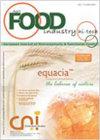Biotechnological Aspects of the Functional Marmalade Development Using Whey for the Gastrointestinal Diseases Prevention
Q Engineering
引用次数: 0
Abstract
The article reveals the development processes and scientific substantiation of the marmalade of functional use, that is a functional product formulation with biologically active bifidogenic properties contributing to the prevention of the gastrointestinal tract diseases. The research relevance is due to the need to prevent the incidence of a new type of coronavirus COVID-19, that affects many systems of the human body, reduces immunity, while using drug therapy often leads to the natural intestinal microflora violation. To prevent the complications development, it is worth using food products capable of stopping destructive processes in the gastrointestinal mucosa during rehabilitation measures. The researchers developed the cranberry marmalade formulations with the probiotic culture introduction of a different mass fraction: sample 1 with probiotics in a free state, sample 2 with introduced immobilized probiotics; sample 3 with pasteurized whey enriched with a bacterial concentrate containing 0.001 % acidophilus bacillus. The control sample were the recipe of fruit and jelly marmalade. A man obtained a juice concentrate by pressing using an enzyme preparations composition of cellulolytic and pectolytic action. The researchers used the vacuum evaporation method to concentrate the juice to a dry matter content of 52-55 %; prepared the marmalade mass under laboratory conditions using traditional technology with a change in prescription components: probiotic culture introduction at the stage of swollen pectin into the cooled syrup at a temperature below 45 °C. The authors used mathematical modeling of formulations in the technological process to establish the ingredients optimal ratios; identified the rational introduction methods of acidophilus bacillus depending on the organoleptic and rheological product properties after a five-fold measurements repeatability.利用乳清开发功能性果酱预防胃肠道疾病的生物技术研究
本文揭示了功能性用途果酱的开发过程和科学依据,这是一种具有生物活性的双歧性特性,有助于预防胃肠道疾病的功能性产品配方。研究的相关性是由于需要预防新型冠状病毒COVID-19的发生,这种新型冠状病毒影响人体的许多系统,降低免疫力,同时使用药物治疗往往导致天然肠道微生物群的破坏。为了防止并发症的发展,在康复措施中使用能够阻止胃肠道粘膜破坏性过程的食品是值得的。研究人员开发了含有不同质量分数的益生菌培养的蔓越莓果酱配方:样品1含有游离状态的益生菌,样品2含有固定化的益生菌;样品3:巴氏灭菌乳清富含含有0.001%嗜酸杆菌的细菌浓缩物。对照样品为水果果冻果酱配方。一个人用一种具有纤维素分解和心肌分解作用的酶制剂压榨得到浓缩果汁。研究人员使用真空蒸发法将果汁浓缩到干物质含量为52- 55%;在实验室条件下,采用传统工艺制备果酱块,改变配方成分:在膨胀果胶阶段将益生菌培养物引入冷却糖浆中,温度低于45℃。在工艺过程中对配方进行数学建模,确定了各成分的最佳配比;通过5倍重复性实验,确定了嗜酸杆菌的合理引入方法。
本文章由计算机程序翻译,如有差异,请以英文原文为准。
求助全文
约1分钟内获得全文
求助全文

 求助内容:
求助内容: 应助结果提醒方式:
应助结果提醒方式:


